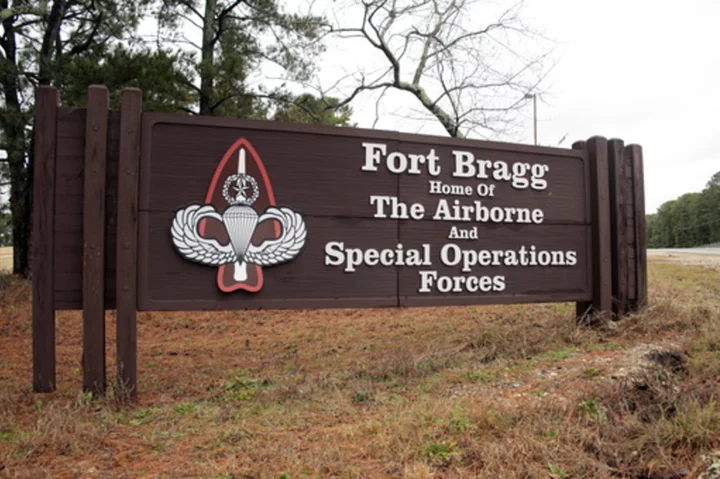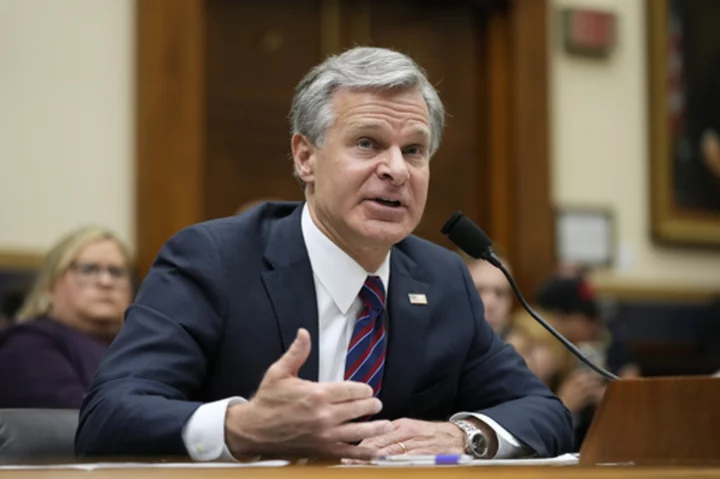RALEIGH, N.C. (AP) — Fort Bragg will shed its Confederate namesake to become Fort Liberty in a Friday ceremony that some veterans view as a small but important step in making the U.S. Army more welcoming to current and prospective Black service members.
The change is part of a broad Department of Defense initiative, motivated by the 2020 George Floyd protests, to rename military installations bearing the name of confederate soldiers.
The Black Lives Matter demonstrations that erupted nationwide after Floyd's killing by a white police officer, coupled with ongoing efforts to remove Confederate monuments, turned the spotlight on the Army installations. A naming commission created by Congress visited the bases and met with members of the surrounding communities for input.
While other bases will be renamed for Black soldiers, U.S. presidents and trailblazing women, the North Carolina military installation is the only one not carrying the name of a person. Retired U.S. Army Brig. Gen. Ty Seidule said at a commission meeting last year that Fort Liberty was chosen as the new name because "liberty remains the greatest American value.”
The cost to rename Fort Bragg — one of the largest military installations in the world by population — will total about $6.37 million, according to a commission report.
The North Carolina base was originally named in 1918 for Gen. Braxton Bragg, a Confederate general from Warrenton, North Carolina, who was known for owning slaves and losing key Civil War battles that contributed to the Confederacy's downfall.
Several military bases were named after Confederate soldiers during World War I and World War II as part of a “demonstration of reconciliation” with white southerners amid a broader effort to rally the nation to fight as one, said Nina Silber, a historian at Boston University.
“It was kind of a gesture of, ‘Yes, we acknowledge your patriotism,’ which is kind of absurd to acknowledge the patriotism of people who rebelled against a country," she said.
The original naming process involved members of local communities, although Black residents were left out of the conversations. Bases were named after soldiers born or raised nearby, no matter how effectively they performed their duties. Bragg is widely regarded among historians as a poor leader who did not have the respect of his troops, Silber said.
For Isiah James, senior policy officer at the Black Veterans Project, the base renamings are a “long overdue” change he hopes will lead to more substantial improvements for Black service members.
“America should not have vestiges of slavery and secessionism and celebrate them,” he said. “We should not laud them and hold them up and venerate them to where every time a Black soldier goes onto the base, they get the message that this base Bragg is named after someone who wanted to keep you as human property.”
The secretary of defense is required by law to implement the naming commission’s proposed changes by Jan. 1, 2024.
James, a former U.S. Army infantry squad leader who served at Fort Cavazos near Killeen, Texas, which was previously named Fort Hood for Confederate Gen. John Bell Hood, described a permissible climate of racism that affected him deeply during his military service.
He recalled feeling like a “circus freak” when his platoon leader made him take pictures on patrol with people who had “never seen a big Black guy before.”
When he first joined the Army, James said, his drill sergeant would make him get down on his knees to talk to him because he didn't want a Black man standing over him.
James said he did not realize his base was named after a Confederate general until after his military service and expects many soldiers at Fort Bragg were similarly unaware.
"I don't think it'll have much of an effect on young soldiers," he said of the name change. “But I think it has a collective effect on society. America does a lot of things wrong, but sometimes we get things right, and this is one of them.”
___
Hannah Schoenbaum is a corps member for the Associated Press/Report for America Statehouse News Initiative. Report for America is a nonprofit national service program that places journalists in local newsrooms to report on undercovered issues.









